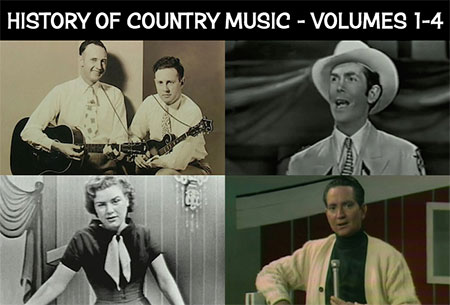The Lost Highway is a four-volume history of country music that utilizes rare film footage and interviews to trace the history and growth of country music, from its roots in mountain music, through bluegrass to the emergence of Hank Williams and honky-tonk, the rise of the pop-friendly Nashville Sound, the emergence of chart-topping female artists and the success of Alt. Country.
Note: This title comes on two discs.
HISTORY OF COUNTRY MUSIC – VOLUME 1
The Big Bang of country music took place in Bristol, Tennessee in August 1927. It was in an abandoned hat factory that East Coast talent scout Ralph Peer set up portable recording equipment and recorded sessions with Jimmie Rodgers and The Carter Family. Rodgers went on to become the first national star of country music, creating a blueprint for almost every solo performer to follow. The influence of the Carter Family, with their soulful gospel harmonies and intricate guitar playing, can be heard in every harmony group since.
Country music has roots in the rural southeast
Mountain Traditions of Tennessee, Kentucky and West Virginia. Songs would be passed down through generations and, because of the isolation of the Appalachians, many songs survived unknown to the outside world until the beginning of the 20th century.
The Role of Radio was important in the development of country music. By 1938, ten million rural families owned radio sets, often run off car batteries. To cater to this audience radio stations began running barn dance shows, the most popular of which was the Grand Ole Opry broadcast from Nashville.
Bluegrass, named after the bluegrass state of Kentucky, was a 1940s development that took traditional string-based mountain songs and built precise vocal arrangements around them. Bill Monroe, a mandolin-playing singer with the highest-pitched voice in all of popular music, was the godfather of bluegrass.
HISTORY OF COUNTRY MUSIC – VOLUME 2
Honky Tonk music came out of the beer-joints and roadside bars; known locally as honky tonks. They were rowdy places; hot beds of beer, lust and fistfights, where performers needed to play loud to compete with the noise. The result was a harsher, amplified and more driven sound, which took as its subject the very essence of bar life; loving, cheating and drinking.
Pioneered by Ernest Tubb, who sang over an electrified guitar for the first time, it also attracted the young Hank Williams who would go on to write such classic Honky Tonk songs as "Your Cheatin' Heart" and "I'm So Lonesome I Could Cry." Hank Williams was a prolific writer and an alcoholic, whose haunting gospel influenced songs are wracked with guilt and remorse and reflect his own troubled life, echoing the ups and downs of a turbulent marriage. Yet such is their power that never had pain and sadness sounded so good.
Honky Tonk barely survived the advent of Elvis Presley and rock 'n' roll. Nashville reacted by closing ranks and creating a smoother more pop friendly brand of country that came to be known as the
Nashville Sound.
Producers Owen Bradley and Chet Atkins would use session artists to lay down an instrumental background with the singer performing vocals, which would then be sweetened with strings and lush vocal choirs giving the sound a smoothness and sophistication far removed from the twanginess of traditional country. Jim Reeves and Eddy Arnold, both of whom had once flirted with honky tonk, built huge careers on the back of the Nashville Sound.
HISTORY OF COUNTRY MUSIC – VOLUME 3
Beyond Nashville is the story of the outsiders from all over America who again and again have rejuvenated country by going beyond Nashville; from the Bakersfield Sound of the 1950s through to the outlaw movement of the 1970s to alt. country today.
Migrants from the Texas and Oklahoma dustbowls in the 1930s kept their music alive in the honky-tonks and juke joints of California's San Joachim Valley. By the 1950s their music had developed a hard-edged amplified sound and a distinct freewheeling identity of its own that challenged the country music establishment.
The Bakersfield Sound is exemplified in the music of Buck Owens and Merle Haggard.
Throughout the 50s and 60s, there had been various attempts to recapture the grit and honesty of country but it was the Outlaw Movement, in the mid 1970s, spearheaded by the Texas duo of Willie Nelson and Waylon Jennings, which really managed to restore something of the original maverick and rebel spirit to the music.
In the 1980s new blood came in the form of the so-called
New Traditionalist Movement. A series of offbeat country artists issued new albums that had a freshness of approach and honesty unknown since the heyday of honky tonk. Record companies scrabbled to sign dozens of handsome, young, new country artists; a phenomenon sometimes tagged "white hat country".
The most exciting movement of recent years,
Alt. Country (alternative country) is committed to a back-to-basics, anti-corporate approach. In particular, alt. country artists see their spiritual forefathers as hardcore country artists; like Hank Williams and Johnny Cash; who have rebelled against sanitized but popular music in the past.
HISTORY OF COUNTRY MUSIC – VOLUME 4
The first million selling record by a country female artist was Patsy Montana's, "I Wanna Be A Cowboy's Sweetheart" in 1935. She became a country institution, giving
Female Country Artists their first new solo style; one that would be adopted by many women singers in the 1940s and 1950s. But it would be artists like honky tonker Jean Shepard and Patsy Cline, one of the greatest country pop stylists of the Nashville Sound era, who really opened things up for women.
The biggest impact of women performers though came in the 1960s with the arrival of Dolly Parton, Tammy Wynette and Loretta Lynn. Loretta Lynn was the
Hillbilly Feminist, a honky tonk-rooted artist not afraid to write songs like, "Don't Come Home-a-Drinkin' With Lovin' On Your Mind" and "Your Squaw Is On The Warpath." Tammy Wynette is country music for many people. She sang about women wronged but also about staying with those men doing the wronging.
Note: This title comes on two discs.
HISTORY OF COUNTRY MUSIC - VOLUMES 1-4 on DVD

Our discs are guaranteed for life.
If a disc ever stops playing correctly
tell us and we'll replace for free.





















